- Home
- David Gemmell
The King Beyond the Gate Page 3
The King Beyond the Gate Read online
Page 3
“How are you feeling?” Tenaka inquired.
“You are a warrior?” Aulin asked, his eyes fearful.
“Yes. But you need not fear me.”
“Nadir?”
“Mercenary. I have prepared you some stew.”
“I am not hungry.”
“Eat it anyway,” ordered Tenaka. The old man stiffened at the authoritative tone, then averted his eyes and nodded. Renya fed him slowly as Tenaka sat by the fire. It was a waste of food, for the old man was dying. Still, he did not regret it and could not understand why.
With the meal over, Renya collected the platters and the pot. “My grandfather wishes to speak with you,” she said, and left the room.
Tenaka moved to the bedside, staring down at the dying man. Aulin’s eyes were gray and bright with the beginnings of fever.
“I am not strong,” said Aulin. “I never was. I have failed everyone who ever trusted me. Except Renya … I never failed her. Do you believe me?”
“Yes,” Tenaka answered. Why was it that weak men always felt the need for confession?
“Will you protect her?”
“No.”
“I can pay.” Aulin gripped Tenaka’s arm. “Just take her to Sousa. The city is only five, six days south.”
“You are nothing to me. I owe you nothing. And you cannot pay me enough.”
“Renya says you were Dragon. Where is your sense of honor?”
“Buried under desert sands. Lost in the swirling mists of time. I don’t want to talk to you, old man. You have nothing to say.”
“Please listen!” Aulin begged. “When I was a younger man I served the council. I supported Ceska, worked for his victory. I believed in him. So I am, at least in part, responsible for the appalling terror he has visited on this land. I was a Source priest once. My life was in harmony. Now I am dying, and I don’t know anything anymore. But I cannot die leaving Renya to be taken by the Joinings. I cannot. Don’t you see? My whole life has been a failure—my death must achieve something.”
Tenaka pulled away the old man’s hand and stood.
“Now you listen,” he said. “I am here to kill Ceska. I do not expect to live beyond the deed, but I have neither the time nor the inclination to take on your responsibilities. You want to see the girl get to Sousa, then recover. Use your will.”
Suddenly the old man smiled, tension and fear falling from him. “You want to kill Ceska?” he whispered. “I can give you something better than that.”
“Better? What could be better?”
“Bring him down. End his reign.”
“Killing him should achieve that.”
“Yes, indeed, but one of his generals would only take over. I can give you the secret that would destroy his empire and free the Drenai.”
“If this is to be a tale of enchanted swords of mystic spells, do not waste your time. I have heard them all.”
“No. Promise me you will protect Renya as far as Sousa.”
“I will think about it,” Tenaka said. Once more the fire was dying, and he fed the last of the wood to the flames before leaving the room in search of the girl. He found her sitting in the cold kitchen.
“I don’t want your help,” she said without looking up.
“I haven’t offered it yet.”
“I don’t care if they take me.”
“You are too young not to care,” he said, kneeling before her and lifting her chin. “I will see that you get safely to Sousa.”
“Are you sure he can pay you enough?”
“He says that he can.”
“I don’t like you very much, Tenaka Khan.”
“Welcome to the majority view!” he said.
Leaving her, he returned to his room and the old man. Then he laughed and moved to the window, throwing it wide to the winter air.
Before him the forest stretched on for a white eternity.
Behind him the old man was dead.
Hearing his laughter, Renya entered the room. Aulin’s arm had slid from the bed, and his bony fingers now pointed at the wooden floor. His eyes were closed, and his face peaceful.
She went to him and touched his cheek gently. “No more running, Aulin. No more fear. May your Source bring you home!”
She covered his face with a blanket.
“Now your obligation is over,” Renya told the silent Tenaka.
“Not yet,” he said, pulling shut the window. “He told me he knew of a way to end Ceska’s reign. Do you know what he meant?”
“No.” She turned away from him and gathered her cloak, her heart suddenly empty. Then she stopped, her cloak falling from her hands as she stared at the dying fire and shook her head. Reality receded. What was there to live for?
Nothing.
What was there to care for?
Nothing.
She knelt by the fire, staring unblinkingly as a terrible ache filled the emptiness within. Aulin’s life had been a steady tale of small kindnesses, tenderness, and caring. Never had he been intentionally cruel or malicious, never greedy. But he had ended his life in a deserted barracks, hunted as a criminal, betrayed by his friends, and lost to his god.
Tenaka watched her, no hint of emotion in his violet eyes. He was a man used to death. Quietly he stowed his gear in the canvas pack, then lifted her to her feet, fastened her cloak, and pushed her gently through the doorway.
“Wait here,” he said. Returning to the bed, he pulled his blanket clear of the corpse. The old man’s eyes had opened, and he seemed to be staring at the warrior.
“Sleep truly,” whispered Tenaka. “I will take care of her.” He closed the dead eyes and folded his blanket.
Outside the air was crisp. The wind had died, and the sun shone weakly in a clear sky. Tenaka took a slow deep breath.
“Now it is over,” whispered Renya. Tenaka glanced around.
Four warriors had left the screen of trees and were walking forward with swords in hand.
“Leave me,” she said.
“Be silent.”
He loosened his pack, lowering it to the snow, then pushed his cloak back from his shoulders, revealing the scabbard sword and hunting knife. Walking forward ten paces, he waited for the warriors, gauging each man in turn.
They wore the red and bronze breastplates of Delnoch.
“What do you seek?” asked Tenaka as they drew near.
None of the soldiers spoke, which marked them as veterans, but they spread out slightly, ready for any aggressive action from the warrior.
“Speak or the emperor will have your heads!” Tenaka said. That stopped them, and their eyes flickered to a sharp-featured swordsman on the left; he stepped forward, his blue eyes cold and malevolent.
“Since when does a northern savage make promises on behalf of the emperor?” he hissed.
Tenaka smiled. They had all stopped and were waiting for an answer; they had lost their momentum.
“Perhaps I should explain,” he said, maintaining the smile and moving toward the man. “It’s like this …” His hand flashed out and up, fingers extended, smashing the man’s nose. The thin cartilage sliced up into the brain, and he dropped without a sound. Then Tenaka whirled and leapt, his booted foot hammering into the throat of a second man. Even as he leapt, he drew the hunting knife. Landing on the balls of his feet, he spun, parried a thrust, and buried his blade in his opponent’s neck.
The fourth man was running toward Renya, sword raised. She stood still, watching him without interest.
Tenaka hurled the hunting knife, which hit the man hilt first at the base of the helm. Unbalanced, the warrior tumbled in the snow, losing his grip on his sword. Tenaka ran forward as he scrambled to rise, then threw himself on the man’s back, and he pitched forward once more, his helm tumbling from his head. Tenaka grabbed his hair, tugging the head back, then took hold of the man’s chin and wrenched it to the left. His neck snapped like dry wood.
Recovering his knife, Tenaka wiped it clean and replaced it. He scanned the clear
ing. All was silent.
“Nadir we,” he whispered, closing his eyes.
“Shall we go?” asked Renya.
Puzzled, he took her arm, gazing down into her eyes.
“What is the matter with you? Do you want to die?”
“No,” she said absently.
“Then why did you just stand there?”
“I don’t know. Shall we go?”
Tears welled in her night-dark eyes, spilling to her cheek, but her pale face remained impassive. Reaching up, he smoothed a tear from her skin.
“Please don’t touch me,” she whispered.
“Now, you listen to me. The old man wanted you to live; he cared for you.”
“It doesn’t matter.”
“It mattered to him!”
“Does it matter to you?” The question caught him cold, like a blow. He absorbed it and searched himself swiftly for the right answer.
“Yes, it does.” The lie came easily, and only when it was spoken did he realize it was not a lie.
She looked deeply into his eyes, then nodded.
“I will come with you,” she said. “But know this: I am a curse to all who love me. Death haunts me, for I should never have tasted life.”
“Death haunts everyone and never fails,” he said.
Together they walked to the south, stopping by the stone dragon. Icy rain had stung her flanks, giving her a diamond sheen. Tenaka’s breath caught in his throat as he gazed on her face; the water had run to the ruined fangs of her upper mouth, forming new teeth of sparkling ice, renewing her grandeur, restoring her power.
He nodded as if hearing a silent message.
“She is beautiful,” said Renya.
“Better than that,” said Tenaka softly, “she is alive.”
“Alive?”
“In here,” he answered, touching his heart. “She is welcoming me home.”
Throughout the long day they pushed on toward the south. Tenaka said little, concentrating on the snow-hidden trails and keeping a wary eye out for patrols. He had no way of knowing if the four soldiers were the full complement of hunters or whether there were several groups pursuing the girl.
In a strange way he did not care. He forced the pace, rarely looking back to see if Renya was struggling. When he did pause to check out skylines or scan stretches of open ground, she was always just behind him.
For her part Renya followed quietly, eyes fixed on the tall warrior, noting the sureness of his movements and the care with which he chose the route. Again and again two scenes played in her mind: the naked dance in the deserted gymnasium and the dance of death with the soldiers in the snow. One scene overlaid the other … blending, merging. The same dance. The movements were so smooth, almost liquid, as he leapt and turned. The soldiers by comparison seemed ungainly; disjointed, like Lentrian puppets with knotted string.
And now they were dead. Did they have families? Probably. Did they love their children? Probably. They had walked into that clearing as confident men. And yet, in a matter of icy moments, they were gone.
Why?
Because they chose to dance with Tenaka Khan.
She shivered. The light was failing, and long shadows crept from the trees.
Tenaka chose a site for his fire against a jutting of rock, sheltered from the wind. It was set in a hollow surrounded by gnarled oaks, and the fire was well screened. Renya joined him, gathering dead wood and stacking it carefully. A sense of unreality gripped her.
All the world should be like this, she thought, ice-covered and cleansed, all plants sleeping, waiting for the golden perfection of spring, all evil withering under the purifying ice.
Ceska and his demon-spawned legions would fade away like the nightmares of childhood, and joy would return to the Drenai like the gift of dawn.
Tenaka removed a pot from his pack and placed it on the fire, scooping handfuls of snow into the container until it was half-full with warming water. Then, from a small canvas sack he poured a generous mixture of oats into the liquid, adding salt. Renya watched him in silence, fixing her gaze on his slanted violet eyes. Once again, sitting with him by the fire, she felt at peace.
“Why are you here?” she asked.
“To kill Ceska,” he replied, stirring the porridge with a wooden spoon.
“Why are you here?” she repeated.
Moments passed, but she knew he was not ignoring her and waited, enjoying the warmth and the closeness.
“I have nowhere else to go. My friends are dead. My wife … I have nothing. The reality is that I have always had … nothing.”
“You had friends … a wife.”
“Yes. It’s not easy to explain. There was a wise man once, in Ventria, near where I lived. I spoke with him often about life, and love, and friendship. He chided me, made me angry. He talked about clay diamonds.” Tenaka shook his head and lapsed into silence.
“Clay diamonds?” she asked.
“It doesn’t matter. Tell me about Aulin.”
“I do not know what he planned to tell you.”
“I accept that,” he said. “Just tell me of the man.” Using two sticks, he lifted the pot from the flames and set it on the ground to cool. She leaned forward, adding fresh wood to the fire.
“He was a peaceful man, a Source priest. But he was also an arcanist and liked nothing better than to scour the land for relics of the Elders. He gained a name for his abilities. He told me that when Ceska first came to power, he supported him, believed all the promises about a better future. But then the terror began. And the Joinings …”
“Ceska always loved sorcery,” Tenaka said.
“You knew him?”
“Yes. Go on.”
“Aulin was one of the first to explore the Graven site. He found the hidden door below the forest and the machines that lay there. He told me his research proved the machines had been created to heal certain diseases suffered by the Elders. But instead of using them in this fashion, Ceska’s adepts created the Joinings. At first they were used only in the arenas, tearing each other to pieces to thrill the crowds, but soon they began appearing on the streets of Drenan wearing armor and the markings of Ceska’s guard.
“Aulin blamed himself and journeyed to Delnoch, ostensibly to examine the chamber of light beneath the keep. From there he bribed a sentry and tried to escape through the Sathuli lands. But the chase began, and we were forced south instead.”
“Where do you come into the story?” he asked.
“You did not ask about me but about Aulin.”
“I am asking now.”
“May I have some porridge?”
He nodded, tested the pot, and handed it to her. She ate in silence and then passed the remains to Tenaka. Finishing the meal, the warrior leaned back against the cold rock.
“There is a mystery around you, lady. But I will leave it lie. The world would be a sad place without mysteries.”
“The world is a sad place,” she said, “full of death and terror. Why is evil so much stronger than love?”
“Who says that it is?” he responded.
“You have not been living among the Drenai. Men like Aulin are hunted down like criminals; farmers are butchered for failing to reach absurd crop levels; the arenas are packed with baying crowds who laugh while animals rip and tear women and children. It is vile! All of it.”
“It will pass,” he said gently. “And now it is time to sleep.” He held out his hand to her, but she shrank back, her dark eyes suddenly fearful. “I will not harm you, but we must let the fire die. We will share warmth, but that is all we will share. Trust me.”
“I can sleep alone,” she said.
“Very well.” He untied the blanket and passed it to her, then wrapped himself in his cloak and leaned his head back to the rock, closing his eyes.
Renya stretched herself out on the cold ground, pillowing her head on her arm.
As the fire died, the night cold grew, seeping into her limbs. She awoke shivering uncontrollably and
sat up, rubbing warmth into her numbed legs.
Tenaka opened his eyes and held out his hand. “Come,” he said.
She moved to him, and he opened his cloak, wrapping it around her and pulling her in to his chest before covering them both with the blanket. She nestled against him, still shivering.
“T-t-tell me about c-c-clay diamonds,” she said.
He smiled. “The wise man was called Kias. He said that too many people go through life without pausing to enjoy what they have, and he told of a man who was given a clay jug by a friend. The friend said, ‘Examine it when you have the time.’ But it was just a simple clay jug, and the man put it aside and forged ahead with his life, spending his time acquiring riches. One day, when he was old, he took the jug and opened it. Within was a huge diamond.”
“I do not understand.”
“Kias claimed that life was like that clay jug. Unless we examined it and understood it, we could not enjoy it.”
“Sometimes understanding robs you of joy,” she whispered.
He said nothing, transferring his gaze to the night sky and the distant stars. Renya fell into a dreamless sleep, her head tipping forward, dislodging the woolen burnoose that covered her close-cropped hair. Tenaka reached up to replace it, then stopped as his hand touched her head. The hair was not close-cropped; it had grown as long as it would grow. For it was not hair but dark fur, soft as sable. Gently he pulled the burnoose into place and closed his eyes.
The girl was a Joining, half-human, half-animal.
No wonder she did not care for life.
Were there diamonds in the clay for such as she? he wondered.
3
At the Dragon barracks a man pushed his way past the screen of bushes before the parade ground. He was a big man, broad shoulders tapering to lean hips and long legs, and was dressed in black and carried an iron-tipped ebony quarter-staff. Hooded, his face was covered by a shaped mask in black leather. He moved easily—the rolling, fluid gait of the athlete—yet he was wary, his bright blue eyes flickering to every bush and shadow-haunted tree.
When he saw the bodies, he circled them slowly, reading the brief battle in the tracks.
One man against four.
The first three had died almost instantly, and that spoke of speed. The fourth had run past the lone warrior. The tall man followed the track and nodded.

 Bloodstone
Bloodstone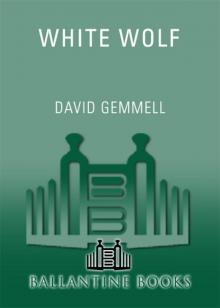 White Wolf
White Wolf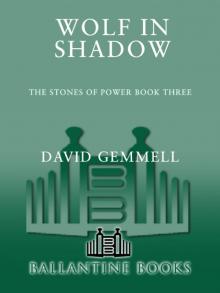 Wolf in Shadow
Wolf in Shadow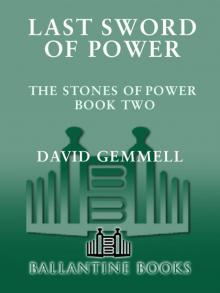 Last Sword of Power
Last Sword of Power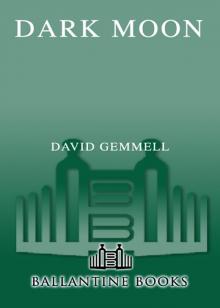 Dark Moon
Dark Moon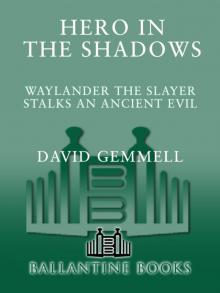 Hero in the Shadows
Hero in the Shadows Gemmell, David - Drenai 09 - Hero In The Shadows
Gemmell, David - Drenai 09 - Hero In The Shadows Waylander
Waylander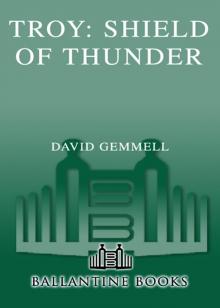 Shield of Thunder
Shield of Thunder Stormrider Stormrider
Stormrider Stormrider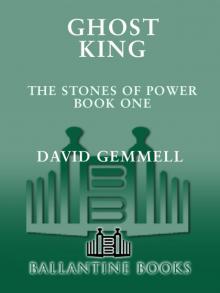 Ghost King
Ghost King Legend
Legend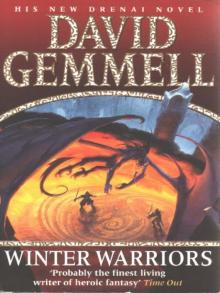 Winter Warriors
Winter Warriors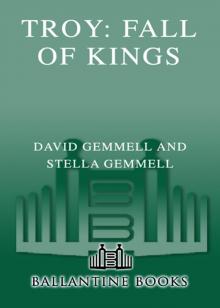 Fall of Kings
Fall of Kings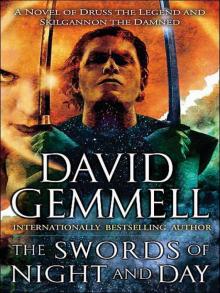 The Swords of Night and Day
The Swords of Night and Day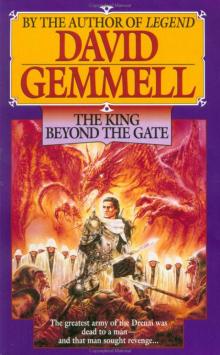 The King Beyond the Gate
The King Beyond the Gate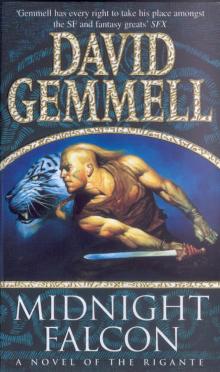 Midnight Falcon
Midnight Falcon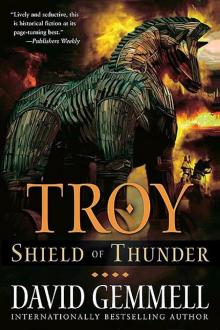 02 - Shield of Thunder
02 - Shield of Thunder In the Realm of the Wolf
In the Realm of the Wolf Ravenheart
Ravenheart The First Chronicles of Druss the Legend
The First Chronicles of Druss the Legend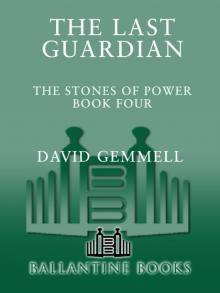 Last Guardian
Last Guardian Stormrider
Stormrider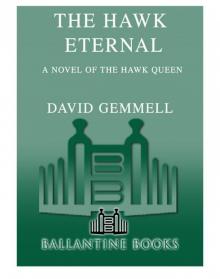 The Hawk Eternal
The Hawk Eternal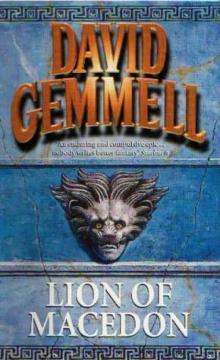 Lion of Macedon
Lion of Macedon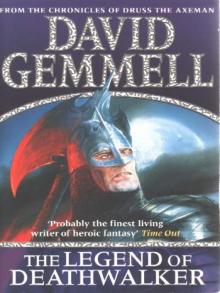 The Legend of Deathwalker
The Legend of Deathwalker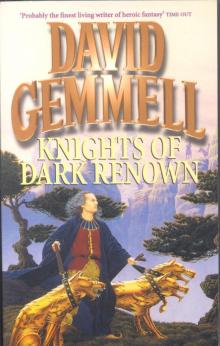 Knights of Dark Renown
Knights of Dark Renown Echoes of the Great Song
Echoes of the Great Song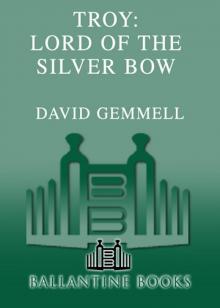 Lord of the Silver Bow
Lord of the Silver Bow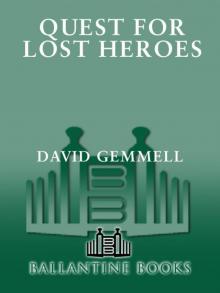 Quest for Lost Heroes
Quest for Lost Heroes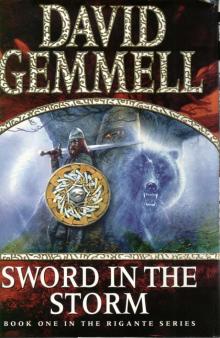 Sword in the Storm
Sword in the Storm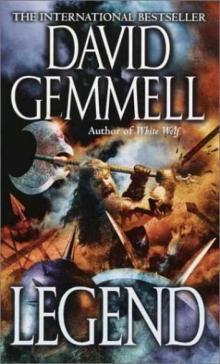 Drenai Saga 01 - Legend
Drenai Saga 01 - Legend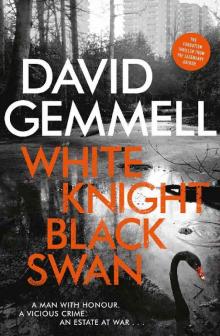 White Knight/Black Swan
White Knight/Black Swan![[Troy 02] - Shield of Thunder Read online](http://i1.bookreadfree.com/i/03/19/troy_02_-_shield_of_thunder_preview.jpg) [Troy 02] - Shield of Thunder
[Troy 02] - Shield of Thunder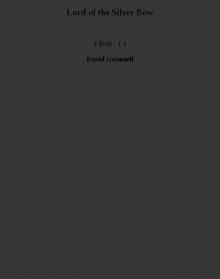 Lord of the Silver Bow t-1
Lord of the Silver Bow t-1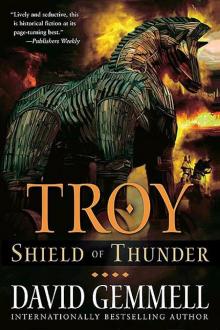 Shield of Thunder t-2
Shield of Thunder t-2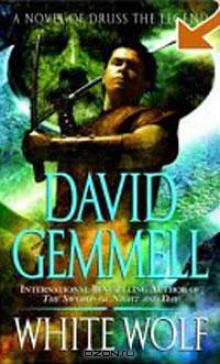 White Wolf: A Novel of Druss the Legend dt-10
White Wolf: A Novel of Druss the Legend dt-10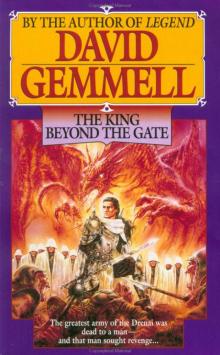 Drenai Saga 02 - The King Beyond the Gate
Drenai Saga 02 - The King Beyond the Gate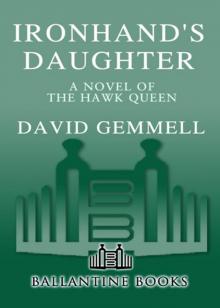 Ironhand's Daughter
Ironhand's Daughter Gemmell, David - Drenai 06 - The First Chronicles of Druss the Legend
Gemmell, David - Drenai 06 - The First Chronicles of Druss the Legend The Last Guardian
The Last Guardian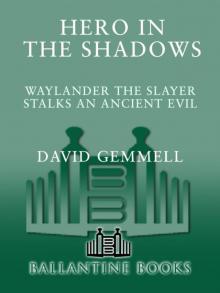 Hero in the Shadows: A Waylander the Slayer Novel
Hero in the Shadows: A Waylander the Slayer Novel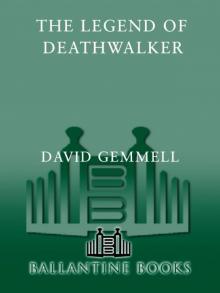 The Legend of the Deathwalker
The Legend of the Deathwalker